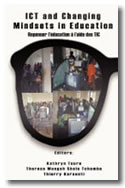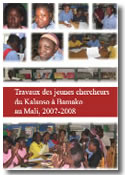Formative Research for informed education policy implementation in Africa April 2, 2006
This presentation seeks to describe formative research and its characteristics and illustrate its advantages as applied to the implementation of education sector programs and reforms. It provides examples of formative research as applied in Africa, describes how formative research can be undertaken, and proposes how the WGESA can facilitate the process.
Formative research is a process-oriented assessment tool that can be adapted for macro-analysis of complex processes, to support systemic change. It focuses on the practicality of “how to” as opposed to just “what is.” It draws on case study approaches and uses qualitative research methods. It provides a mechanism for regular and methodical reflection and dialogue throughout implementation, generates knowledge, builds competencies and confidence, and can improve the results of a systemic change process. Formative research requires a changing mix of sensitivity to the local political situation and an independent critical posture.
The ADEA Working Group on Education Sector Analysis (WGESA) is well placed to facilitate the appropriation of formative research as a systemic approach to supporting reform implementation. One of working group’s strengths has been its experience with analytical work understood as a technical activity, as part of the aid relationship, and therefore also as a political activity. With a view to extending sector analysis beyond policy and strategy development to support and strengthen program implementation, the WGESA, building on recent experience on the continent and in partnership with willing ministries, research institutions and development partners, could help refine formative research methodology as applied to education sector analysis.
Participating countries should have well worked out sector programs and an expressed desire for support for reform implementation. Strong national commitment is necessary for the process to serve as an effective tool for partners, which ultimately serves the beneficiaries of the national education system. Decision-makers, researchers and civil society representatives in the pilot countries should benefit from joint training workshops in which experiences are shared transnationally. The process will encourage southern partnerships to increase the quality of education while not excluding partnerships with northern ministries of education and institutions of higher learning.
The formative research activity would also support WGESA strategies for Africanization. Activities are grounded in country, priority issues to be studied are decided by the national government, and the process grows national institutional knowledge and competence while facilitating the consumption of local research findings in daily decision-making.
[Download the presentation] or [Download the abstract]
Toure, K., & Lefoka, P. (2003). Formative Research to support education policy implementation in Africa. White paper for Working Group on Education Sector Analysis (WGESA), Biennale of the Association for the Development of Education in Africa (ADEA) on the Quest for Quality: Learning from the African Experience; Grand Baie, Mauritius, 3-6 December.



Leave a Reply